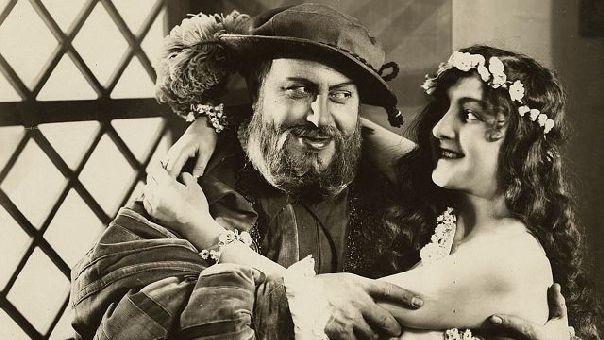Anna Boleyn (1921) 

Director: Ernst Lubitsch
Cast: Henny Porten, Emil Jannings, Paul Hartmann
Synopsis: The story of the ill-fated second wife of the English king Henry VIII, whose marriage to the Henry led to momentous political and religious turmoil in England.
Quite why German production company UFA felt it necessary to change the name of King Henry VIII’s second wife from Anne to Anna is unclear, but whatever the reason, the film Anna Boleyn plays fairly fast and loose with the facts, portraying Boleyn as a wide-eyed innocent when in fact she was anything but. Henry’s pursuit of Anne began more than five years before they were finally wed, and she had huge influence over his diplomatic decisions long before he had his marriage to Catherine of Aragon annulled. Neither was her fall from grace quite as swift as depicted in this picture. After giving birth to a daughter who would become the future Queen Elizabeth I, Anne had the time to suffer a series of miscarriages before Henry engineered accusations of high treason against her so that he could marry Jane Seymour, who would go on to give him the son he so desperately craved.
Anna Boleyn begins with the young naif Anna (Henny Porten) voyaging across the English Channel on her way to become a lady-in-waiting to Queen Catherine (Hedwig Pauly-Winterstein). She’s met at the docks by Sir Henry Morris (Paul Hartmann — Schloss Vogelod) to whom she is secretly betrothed. However, that relationship is poisoned by Norris’s jealousy when he twice mistakenly believes Anna to be carrying on with King Henry VIII (Emil Jannings). Rather than welcoming the King’s advances as Sir Henry believes, Anna is valiantly fighting for her honour — “I’m not like that, King Henry!” she admonishes him — but it’s to no avail: when the King of England’s got you in his sights there’s precious little you can do to escape him.
Henry is so enamoured of Anna that he orders his marriage to Queen Catherine to be annulled; it’s a command which ultimately results in Henry defying the Pope and Catholicism and establishing the Church of England. With Catherine out of the way, Henry marries Anna over the objections of many of the English people. However, when she fails to give him a son, Henry quickly grows tired of her and his attentions turn to Anna’s saucy young lady-in-waiting, Jane Seymour (Aud Egede-Nissen).
Even though Anna is painted as a powerless victim throughout the picture, she can’t really have much to complain about when the spirited Jane Seymour appears on the scene. It’s true that Seymour is painted as a much more active participant in Anna’s downfall than Anna was in Catherine’s — “I serve you as you served Catherine,” she sniffily replies when confronted by her Queen — but at the end of the day the result was just the same. Mind you, Catherine did get to keep her head, which can’t be said of poor Anna. Henny Porten certainly depicts Anna as some wretched spirit with no room for manoeuvre and the weight of impending death weighing heavily on her shoulders, and it’s not pretty to watch. She trudges through the film as if perpetually on the verge of swooning, and can’t even descend half a dozen steps without resting her forehead against the wall for support. It truly is an intensely irritating performance which completely defuses any sympathy the audience might have for her. The poorness of her performance is surpassed only by the comical histrionics of Hedwig Pauly-Winterstein as Queen Catherine, but at least Pauly-Winterstein had the excuse of this being her first ever screen appearance.
Emil Jannings, that grand old bear of German cinema whose career took a nosedive when he threw his lot in with the Nazis, fares much better as the portly King of England. He plays Henry as a spoiled, licentious bon vivant, quick to anger and prone to bouts of violence when crossed, and he looks every inch like a spoiled monarch who expects to have his way in all things. His pursuit of the hapless Anna is intense and unyielding and vaguely unpleasant to watch, and director Ernst Lubitsch, intercutting between Anna and her ladies-in-waiting cooing over the new-born Elizabeth, and four servants attempting to put gloves and boots on Henry, adeptly suggests that the King of England is little more than an overgrown baby.
The film Anna Boleyn is a handsomely mounted picture with high production values that are reflected in huge and impressive sets, elaborate costumes and a cast of thousands. In this respect it rivals its Hollywood counterparts in all departments, but sadly it lags behind when it comes to entertainment value because for long periods Anna Boleyn is something of a slog thanks to its turgid pacing.
(Reviewed 22nd July 2014)
httpv://www.youtube.com/watch?v=P64XwxH4qvU
